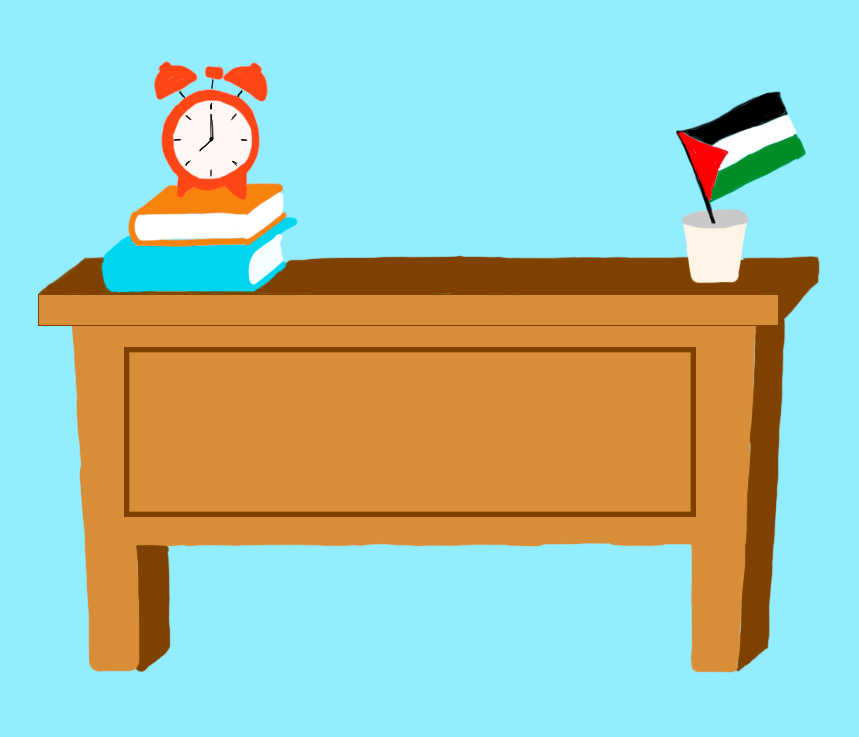Following last year’s rise in pro-Palestinian activism on campus, Kent Schull, an associate professor of history and the director of the Center for Middle East and North Africa Studies, reintroduced and taught a Palestinian History course this semester.
Examining over 100 years of history of the Palestinian people, Schull last taught the class in 2020 and saw the need for a course addressing questions of Middle Eastern politics. He said this became evident after the spring’s large student protests and encampments across the country, including at Binghamton University.
“It’s really covering from the late 19th century to the present,” Schull said in an interview with Pipe Dream. “That’s what this focus is on, when notions of Palestinian nationalism, Jewish nationalism, started to emerge, and that they both have this focal point on the same territory for their homeland, but that’s what they’re claiming for their state. And so the origins of that contestation is in the late 19th century.”
Added to the course schedule during the summer after the initial registration period had closed, 15 students enrolled. While others expressed interest, the late add time prevented some from registering.
On Nov. 14, the class discussed the Six-Day War of 1967, where Israel defeated a coalition of Arab states — primarily Egypt, Jordan and Syria — and conquered territories four-times its initial size. These included the Gaza Strip, West Bank, East Jerusalem, the Sinai and the Golan Heights. Peace treaties were signed between Israel and Egypt and Jordan at later points, and Schull described the ideological debates intertwined with land division in historically significant areas like Jerusalem, including how settlements complicate these issues.
Schull reviewed the formation of the Palestine Liberation Organization and the rise of Palestinian nationalism. As a newer leader, Gamal Abdel Nasser, the president of Egypt, was attempting to avoid war with Israel and consolidate his domestic rule, so the Arab League established the Palestine Liberation Organization in 1964 to pacify the Palestinian people.
After the war, United National Resolution 242, adopted by the Security Council, was meant to bring peace to the region, Schull said, but it was rejected by Palestinians at the time because they felt it ignored their concerns, prioritizing only Israel and the Arab states. As a result, they later installed Yasser Arafat, a Palestinian political leader who co-founded Fatah — an acronym for the Palestinian National Liberation Movement — as the head of the PLO.
The PLO’s charter cites armed struggle as the only path to liberation. Schull said it was run through democratic centralism, where each decision was made through a total consensus. Because the PLO consisted of multiple militia groups with ideological differences, it was not the most efficient system, he added.
Concluding with a discussion of Edward Said, a Palestinian American literary critic and activist, the Nov. 14 class emphasized the different perspectives on liberation within the Palestinian diaspora.
Schull said he hopes to teach the course again next semester and encouraged all students to stop by and learn more about Palestinian history.
“I’ve gotten a lot of really positive [responses],” Schull said. “And I just say, you know, anybody can come in at any time they want to, and sit in and listen if you want. It’s more kind of trying to just show support for the broader community here and also for anybody who’s interested in trying to understand factually what’s happening, as opposed to trying to get it out of the ideologies, so I’ve had just had a very good response.”
BU is not the only public institution to offer more Palestinian-focused courses. The newly established Arab and Palestinian studies program at the University of California, Berkeley is the first of its kind.
Desiree Hough, a junior majoring in history who joined the class as a transfer student, said the experience has increased her awareness of Palestinian diversity and complex identities. She said that in past semesters, the University has offered classes about the history of Israel and an class entitled “Israeli-Palestinian Conflict,” but that it has been awhile since a class like this has been taught.
“This course, it offers a broader view of who Palestinians are, what it means to be Palestinian, their identity and everything in relation to that and this course has taught me that Palestinians, their identity is vast,” Hough said. “They can be Christians, Arab, Muslim, Jewish. There are Israeli-Palestinians, Palestinian-Israelis. It’s such a broad identity. You can’t just slap Arab onto a Palestinian, because it doesn’t just fit them.”



